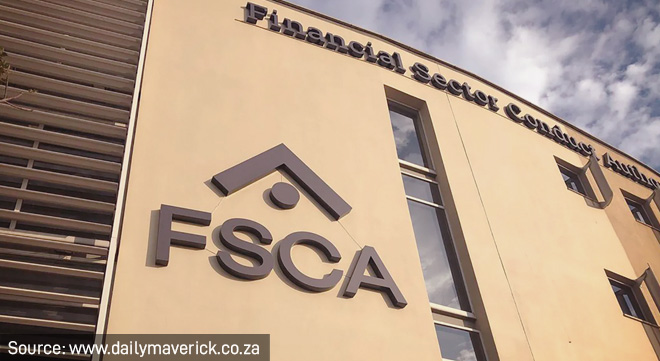Authorised financial services providers that may have advised or assisted their clients to invest in BHI Trust products are being investigated to determine whether these providers acted with due care and diligence.
Early last month, Craig Warriner, the fund manager and a trustee of BHI Trust, handed himself over to authorities. He allegedly admitted to using the trust’s funds in a highly irresponsible manner.
Shortly after the financial scandal broke, the FSCA confirmed it was investigating the activities of the trust and the possibility that it was conducting unauthorised financial services (FSP) business and unauthorised collective investment scheme (CIS) business. At the time, the FSCA confirmed that none of the parties under investigation were authorised as financial services providers or licensed as CIS managers.
The Authority also indicated that its investigation would include regulated entities that may have promoted the products of BHI Trust.
Read: BHI Trust: The walls start tumbling down
In an update issued late last week, the FSCA shared that the focus of its investigation into FSPs that may have recommended the trust to their clients was to determine whether these providers considered suitability and risk when advising their clients.
“However, FSCA’s decision to extend the investigation should not be understood to convey that any regulated entity has contravened the law. If there are material developments in the matter, the FSCA will update the public,” the media statement read.
Limits of the FSCA’s investigative powers
As to its investigation into the activities of the trust, Warriner, “and other persons connected to the BHI Trust”, the Authority said it had expanded the scope of its investigation “in respect of the financial sectors laws and parties involved” – specifically, possible contraventions under sections 2 and 4 of the Financial Institutions (Protection of Funds) Act 28 of 2001. The FSCA also confirmed that it was liaising with the criminal prosecuting authorities regarding its investigation.
The Authority, however, said it was important to note that as a creature of statute, the FSCA’s investigative powers were, in terms of section 135 of the Financial Sector Regulation Act, restricted to contraventions of financial sector laws. This excludes Common Law fraud.
The authority further added that it was not in a position to specify “the duration of the expanded investigation, the identities of additional parties being investigated, or what further contraventions may be uncovered”.
“Subject to the FSCA’s information sharing obligations, the FSCA is also unable to comment on any findings or possible intended regulatory actions that may arise from the investigation, as it is ongoing and subject to due process and confidentiality constraints,” the statement read.
Neither is it able to comment on whether investors will be able to recover any of their funds, the Authority said.
While the complete scope of the fraud is still undisclosed pending further investigations, it is speculated that BHI Trust had a worth of R3 billion thanks to the individual investments of more than 2 000 clients.
Read: Financial intelligence centre ‘freezes’ BHI Trust bank account
BHI Trust was placed under provisional sequestration by the High Court in Johannesburg on 25 October. On the same day, the Financial Intelligence Centre (FIC) temporarily froze a Nedbank account in the name of BHI Trust. According to the court-appointed joint provisional trustees (JPTs) – Gert de Wet and Sumaya Mohamed of Kaap-Vaal Trust – the bank account holds R4 785 164.96 – a mere drop in the ocean of what is estimated to have been lost.




The Regulator, FSCA, and various other authorities have not acted in the manner in which they should to protect all parties concerned from misrepresented or fraudulent schemes. The FSCA had ample opportunity to investigate BHi in 2014/15, then in 2018 and again in 2020, according to various reports. They say they are not at liberty to disclose or discuss these findings and are answerable to National Treasury to whom they send these findings and reports. If the buck stops at National Treasury and these reports are merely filed and never acted upon, then surely the buck stops at National Treasury. It is high time that all parties losing out, from investors, to advisors, to legal firms, accounting firms et al, that some form of class action should be put together against all the Regulatory bodies and ending up in compensation by National Treasury. A few years back the then FSB also investigated a massive Ponzi scheme in Cape Town and gave it the “all clear” long before a certain Mr Pretorius shot his partner then himself….when is this going to stop?
My wife and I lost close to7 million in this unprotected scheme..which we were convinced was safe duped by intermediary .we relied on this income to live now we have nothing.
I wholeheartedly agree with Peter’s comment. The FSCA concluded in their investigation back in 2020 that Craig Warriner had contravened a number of financial securities regulations.
Why did they not suspend/shut him down immediately? In the intervening 3 years a lot of investors unwittingly continued putting money into this scheme.
My husband and I invested our “pension” in November 2022. We, and numerous others, could have been spared these devastating losses, if the FSCA acted on their findings.
THAT IS WHY I DO NOT A nd NEVER BE IN Fvour of companies that starts with initials. Biggest hiding place